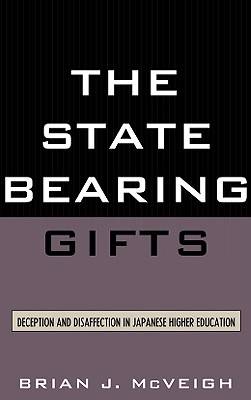
- Afhalen na 1 uur in een winkel met voorraad
- Gratis thuislevering in België vanaf € 30
- Ruim aanbod met 7 miljoen producten
- Afhalen na 1 uur in een winkel met voorraad
- Gratis thuislevering in België vanaf € 30
- Ruim aanbod met 7 miljoen producten
Zoeken
The State Bearing Gifts
Deception and Disaffection in Japanese Higher Education
Brian J McVeigh
Hardcover | Engels
€ 218,95
+ 437 punten
Uitvoering
Omschrijving
Using Japanese higher education as a case study, author Brian J. McVeigh explores the varieties of 'exchange dramatics' among the Education Ministry, universities, faculty, and students. With one eye on large-scale processes and the other on everyday practices, he elucidates trafficking between micro- and macro-levels and key concepts of 'value, ' 'exchange, ' and 'role performance' by studying how political economy configures dramatization and deception at the everyday level. Relying on extensive ethnographic participant observation and the notion of the 'gift, ' McVeigh challenges the commonly accepted idea of 'social contract' for understanding state-society relations. Written to be read as both a political and philosophical commentary and anthropological investigation, this work has theoretical implications for comparative studies of political systems, particularly regarding the relation between self-deception and the ideological manufacture of legitimacy.
Specificaties
Betrokkenen
- Auteur(s):
- Uitgeverij:
Inhoud
- Aantal bladzijden:
- 308
- Taal:
- Engels
Eigenschappen
- Productcode (EAN):
- 9780739113448
- Verschijningsdatum:
- 1/09/2006
- Uitvoering:
- Hardcover
- Formaat:
- Ongenaaid / garenloos gebonden
- Afmetingen:
- 156 mm x 238 mm
- Gewicht:
- 580 g

Alleen bij Standaard Boekhandel
+ 437 punten op je klantenkaart van Standaard Boekhandel
Beoordelingen
We publiceren alleen reviews die voldoen aan de voorwaarden voor reviews. Bekijk onze voorwaarden voor reviews.











